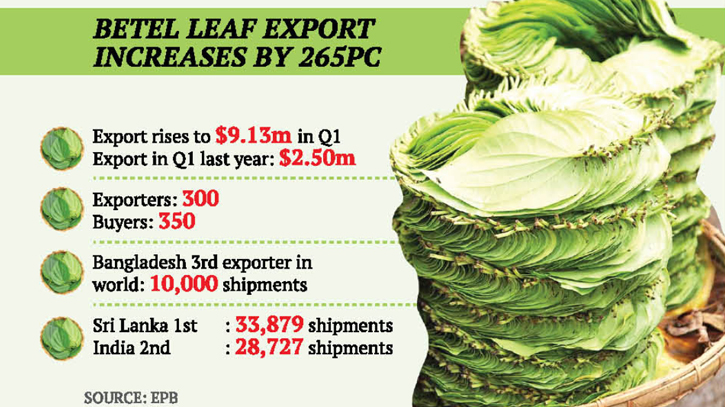
Photo : Messenger
Export of betel leaf has experienced a remarkable upturn since lifting an embargo slapped earlier by the European Union (EU), surging from $2.50 million to an impressive $9.13 million in the first quarter (Q1) – thereby marking a staggering 265 percent year-on-year growth. This latest surge in betel leaf export has been reported by the Export Promotion Bureau (EPB).
Sources in the Bangladesh Betel Leaves Exporters Association (BBLEA) disclosed that Bangladesh's betel leaf exports have witnessed a notable surge – thereby totaling a substantial 9,000 kilogrammes, distributed by 271 Bangladeshi exporters to 350 discerning buyers.
Md. Hafizur Rahman, secretary of Shyambazar Krishi Pannya Arat Banik Samiti, told The Daily Messenger, “While the removal of the EU ban has spurred this growth, there remain critical terms and conditions affecting the trade. Exporters have found themselves in a quandary as buyers subject the product to a rigorous quality test lasting seven days.”
“During this critical period, the betel leaves risk a decline in quality, potentially hindering the otherwise smooth export process,” added Md. Hafizur. “Adding to the complexity, the pricing of betel leaves is far from standardised, as it hinges on the leaf's place of origin.”
“The arduous transportation process occasionally results in the spoilage of some betel leaves, making it challenging for wholesalers to set a consistent price for this sought-after commodity,” lamented Hafizur.
It was known that on the global stage, the top three betel leaf exporters include Sri Lanka with a substantial 33,879 shipments, followed closely by India with 28,727 shipments. Bangladesh, with 9,035 shipments, takes a respectable third place in this industry hierarchy.
Bangladesh, recognised as a major producer of betel leaves, traditionally exports this culturally significant product to European countries, particularly those hosting vibrant communities of Asian immigrants, such as the UK, Germany, and Italy. Additionally, betel leaves find their way to parts of the Middle East, notably Saudi Arabia.
Betel leaf production within Bangladesh has experienced remarkable growth, surging more than fourfold since the early 1970s. Presently, country cultivates nearly a quarter of a million tonnes of betel leaves each year across more than 50,000 acres of land scattered across diverse regions.
Estimates from the Bangladesh Fruit, Vegetable, and Allied Products Exporters Association indicate that, with a favourable exportable surplus, Bangladesh stands to potentially earn up to $60 million from betel leaf exports.
It may be mentioned that the allure of betel leaf grown in Kustia, renowned for its distinct flavour and cultural significance, has not only captivated local markets but has also garnered attention beyond the country's borders. As a result, an increasing number of farmers have embraced betel leaf cultivation.
For instance, in the fiscal year 2021–22, betel leaf was cultivated on 2,230 hectares of land, marking a 4 percent increase compared to the previous year.
According to sources at the Department of Agricultural Extension (DAE), at least Tk 35 crore worth of betel leaf is exported from the three upazilas of Kustia, Moheshkhali, and Jhenaidah each year.
Messenger/Jannatul/Disha








